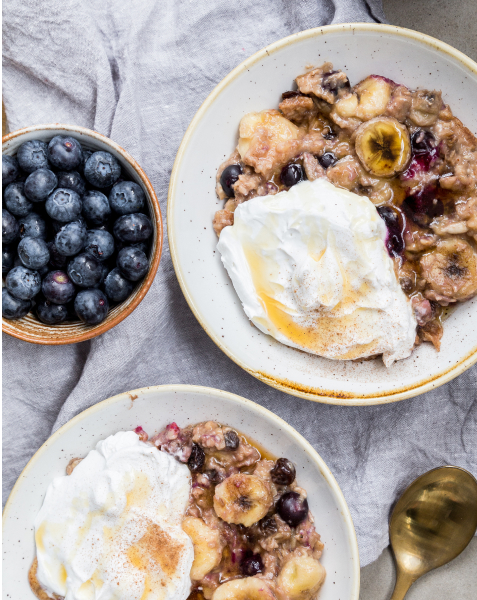We’ve all experienced those sluggish, low-energy days when it feels as though you’re dragging your feet through life. And you’re not alone in that feeling, being tired and having low energy is the most complained about symptom from patients to GPs in the UK. Did you know that what you eat can play a crucial role in turning that around?
At Deliciously Ella we’re passionate about harnessing the power of food to naturally boost your energy levels. So, here’s a breakdown on the intricate link between your diet and your energy levels and how making the right food choices can lead to a more vibrant, energised life.
Here are 4 ways to improve your energy:
1. Think about balancing your blood sugar
Balancing your blood sugar is one of the quickest ways to see a benefit to your energy levels, as it keeps energy levels much more stable and avoids energy dips and spikes. Eating lots of high sugar, low fibre foods causes these rapid spikes and crashes, which leave you feeling tired, irritable and craving more sugar. So, to improve your energy think about reducing the amount of white refined carbohydrates in your diet and make sure your plate is well balanced with a mix of wholegrains, healthy fats and protein. Combining protein and healthy fats with your wholegrains will slow the release of the meal and support your blood sugar. In terms of quantity, we should for about 50g of protein a day.
Foods to choose for fibre: wholegrains, such as oats, quinoa and brown rice, as they release their energy much more slowly into your blood stream.
Foods to choose for protein: hummus, chickpeas, beans, pulses, lentils, seeds, nuts, tofu, tempeh, tahini, quinoa and nut butters.
Suggested swap: swap any sugary breakfast cereals for overnight oats, porridge or a healthy, nutty granola and add nut butter and a spoonful of hemp seeds on the top.
2. Eat more iron
Low iron can impact your energy; when you have low iron it can feel like a deep fatigue and cause symptoms like brain fog, low immunity or heavy periods.
Foods to choose: black beans, chickpeas, cashews, edamame, peas, tomato paste, beetroot, dark green leafy vegetables, pumpkin seeds, quinoa, tofu and dark chocolate are all great plant-based sources of iron. It can be harder to absorb iron from vegetable sources so pairing foods high in iron with foods that are high in vitamin C can help to increase the uptake. Fortunately, most plant-based sources of iron are also a source of vitamin C, but to boost this further you can simply add a squeeze of lemon juice to salad dressings or add a handful of red peppers to your meals.
Foods to avoid: coffee and tea during or after a meal can slow the absorption of iron, so best to have these either side of a meal.
3. Add B vitamins, magnesium and omega 3 to your diet
Every cell in your body needs B vitamins and magnesium to make energy, and omega 3 helps our cells to make this energy more efficiently. You can easily get most B vitamins on a plant-based diet, the only one you cannot get through diet is vitamin B12. If you are eating a fully plant-based diet, then it’s worth getting your vitamin B12 levels checked each year and supplementing with a good quality vitamin B12.
Foods to choose for B vitamins: Green leafy vegetables, sunflower seeds, chickpeas, beetroot, cashews, marmite are all great plant-based sources of B vitamins.
Foods to choose for magnesium: banana, kale, oats, brown rice and quinoa are all good plant-based sources of magnesium.
Foods to choose for omega 3: flax seeds, hemp seeds, walnuts are great plant-based sources of omega 3 and you can also supplement with an algae-based DHA.
4. Reduce energy-sapping foods
There are certain foods that can have an adverse effect on our energy levels, so just as we look at those foods to add to our diets, we should consider those foods to reduce.
Be mindful of your caffeine intake
Caffeine in and of itself isn’t bad for us, the real problem comes when someone is running on empty, replacing meals with caffeine or having too many cups of caffeine per day, as it can have a negative impact on our ability to synthesise energy. Running on empty is also demanding for our adrenal systems, which are important to keep healthy if we want to feel energised. Caffeine can also impact your sleep which will of course impact your energy levels. If you drink a cup of coffee at midday, ¼ of that caffeine can still be in your blood stream at midnight.
On average we should aim for no more than 1-2 cups of caffeine/day. If you’re currently drinking more than this then reduce slowly, rather than all at once.
Have the last cup of caffeine at 3pm or even earlier if you’re not sleeping well.
Reduce refined white carbohydrates
This includes anything with added sugar, anything with a long list of ingredients that you can’t decipher or overly refined foods.
Limit artificial sweeteners: Artificial sweeteners can have an adverse impact on our blood sugar, they can trick the body into thinking that it is getting energy and sugar when it in fact isn’t. This can have an adverse effect on our metabolism and on our energy production.
Limit burnt foods: Burnt foods contain certain compounds that can affect our ability to create energy. It all comes back to what we know to be true for so many reasons; the best way to approach your diet is to include a real variety of fresh and vibrant, wholefoods. Putting plant-based foods of all different colours, onto your plat each day is a great place to start. If you want a little more help on achieving a balanced plant-based diet, helping tackle many of the areas we’ve covered here, then try one of our nutritionist approved meal.
Conclusion
What you eat can have a profound impact on your energy levels. By making mindful choices and nourishing your body with whole, nutrient dense foods you can start to boost your energy levels and say goodbye to those mid-afternoon crashes and sugar cravings. For recipes ideas, have a look at the round ups below.


















